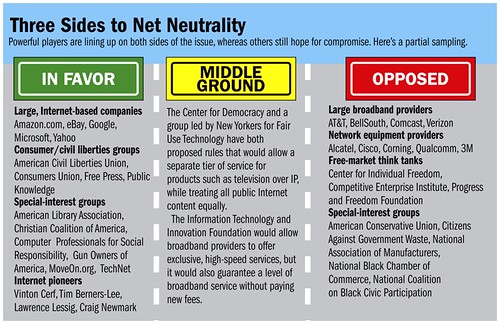Net Neutrality
Net Neutrality is the principle that all communication through the internet should be treated neutrally, with none favored or discriminated against. For example, an Internet Service Provider (ISP) such as AT&T wouldn’t be able to promote their DirectTV when a user searches for Netflix. Net neutrality is essential for the user to share and receive content that they want without interference, and is fought for in the United States as well as other countries.

In 2005, the Federal Communications Commission (FCC) began the fight for net neutrality. BitTorrent was a service that shared files from peer to peer. However, most of the files shared were pirated, and Comcast slowed connections that used BitTorrent. The FCC ordered Comcast to stop but was sued by Comcast who won. In 2010, the FCC passed another net neutrality bill but was sued by Verizon in 2014. Once again, the FCC lost because it had no authority to impose the net neutrality regulations against broadband services. In 2015, the FCC brought up the issue of Internet fast lanes, where companies could pay the ISPs to allow faster access to their sites while companies with smaller budgets wouldn’t be able to. They passed another net neutrality law but won the lawsuits this time.

In 2017, the newly appointed chairman of the FCC, Ajit Pai, reverted the net neutrality law. In 2018, many states in America sued the FCC and wanted the return of the new laws, but lost in court. Today, we have net neutrality laws that are state-level, and many states ban agencies from doing business with ISPs that don’t support net neutrality. Now, in 2022, net neutrality is looking towards a comeback in America because of the newly appointed Jessica Rosenworcel. Net neutrality affects our daily lives by promoting or hiding content from us, the user. Some countries take advantage of the absence of net neutrality, including China and Portugal, to censor media from their citizens.



